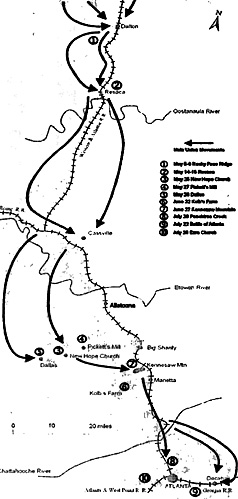 The first actions of the campaign
foreshadowed the typical pattern of Sherman's
advance.
The first actions of the campaign
foreshadowed the typical pattern of Sherman's
advance.
- 1) the Confederates would hold an
excellent defensive position that would be costly (or
downright foolish) to attack.
2) The Yankees would then move to the right or left or both, and find a way to outflank the offending position.
3) Johnston, upon learning of the new threat, would simply withdraw.
This happened in front of Dalton at Rocky Face Ridge on May 5-9, Johnston fell back to Resaca, a series of actions here during May 13-16 ended with Johnston just managing to extricate his army and retreating twenty-five miles to Cassville. Here he attempted a counterstroke while Sherman's armies advanced on a broad front, it came to naught and he was persuaded by Hood and Leonidas Polk that their position was untenable, so once again the Army of Tennessee fell back this time to Allatoona Pass. Sherman saw the Pass as too strong to attack, therefore he once again pinned the Confederates in place and used superior numbers to move by the flank, this resulted in the fighting at New Hope Church (Dallas) on May 25-27.
Johnston fell back again, to a formidable position on Kennesaw Mountain, he was now only twenty miles or so from Atlanta, and it was now almost the end of June. Perhaps by now Sherman was fed up of playing cat and mouse or maybe he didn't want to waste any more time, for whatever mason he abandoned his tactic of out maneuvering the Confederates and frontally assaulted Johnston's position, the result, on June 27 was a bloody debacle. Nonetheless, once bitten Sherman went back to his old ways and within a week Johnston's army was entrenched behind prepared fortifications on the Chattahoochee River, a mere seven miles from the center of Atlanta. This barrier was once again turned and the Army of Tennessee had to abandon its carefully selected killing ground, Johnston's army was now south of Peachtree Creek, almost inside the city's defenses.
On the evening of July 17, Joseph E. Johnston was relieved of command, Jefferson Davis, his advisors and the Confederate people had had enough, they simply wanted Atlanta saved, politically the North must be denied a victory before their upcoming elections, the peace party had to win, Johnston's replacement was the dour John Bell Hood.
Johnston's replacement by Hood came as no surprise to many and certainly not to Hood himself, as early as March 7, Hood was writing to the Confederate President undermining Johnston and agreeing with Davis' own strategies "...will give us an army of 60,000 or 70,000 men, which I think, should be sufficient to defeat and destroy all the Federals on this side of the Ohio river."
First Hood and then Polk began to constantly carp to Davis about Johnston's operations and both bewailed missed opportunities and the constant withdrawals without a fight. By the end of May Hood was building up a power base in the Army of Tennessee, as he already had the ears of Jefferson Davis and his military advisor Braxton Bragg, things did not look good for Joe Johnston, either Johnston would have to reverse his cautious retreat with spectacular results or his days were numbered.
As the situation worsened Bragg was sent to Atlanta, arriving July 13, with a view to "ascertaining the position of his (Johnston's) army, its condition and strength.." Hood took the opportunity to further project his own views and on July 15 in a memorandum to Bragg stated "attack him (Sherman), even if we should have to recross the river to do so," and finally the damning "I regard it as a great misfortune to our country that we failed to give battle to the enemy many miles north of our present position."
Bragg concluded his observations with "If any change is made, Lieutenant-General Hood would give unlimited satisfaction, and my estimate of him already high, has been raised by this campaign. Do not understand me as proposing him as a man of genius, or a great general, but as far better in the present emergency than any one we have available." Two days later Hood was given command of the Army of Tennessee.
Hood may have been sure of both his destiny and his ability to halt Sherman, but as usual, the senior generals of the Army of Tennessee were at odds with their leader. Hardee was angry at being bypassed for a junior, even though he had shown great reluctance to command the army himself once before. Generals Stewart, French, and Stevens were "sorry" that Johnston had been replaced. Benjamin Cheatham was surprised and Patrick Cleburne expressed doubts about Hood's leadership ability.
Further down the chain, it would seem just as bad. What little fighting Johnston did do in his long retreat was actually done by Hood's division, and the rank and file perceived all his efforts as nothing more than b1oody repulses. Many soldiers, however, were also sick of retreating, and knew that something had to be done to reverse their fortunes. With the aggressive Hood now in command, that something could only mean a pitched fight.
Hood at Atlanta 1864
- Background
The Campaign
Battle of Peachtree Creek
Peachtree Creek Wargame
Peachtree Creek Order of Battle: Union
Peachtree Creek Order of Battle: Confederate
Peachtree Creek Map (114K)
Back to Table of Contents -- Charge! # 3
Back to Charge! List of Issues
Back to MagWeb Master Magazine List
© Copyright 2004 by Scott Mingus.
This article appears in MagWeb.com (Magazine Web) on the Internet World Wide Web.
Other articles from military history and related magazines are available at http://www.magweb.com